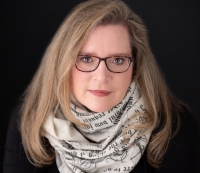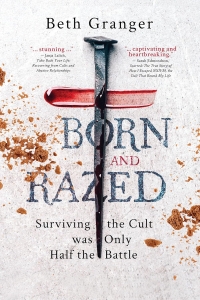I Can't Stop Thinking About Aaron
Every time I think about Aaron I think about his family, and my heart breaks. I think about his mom, who was my roommate at Grenville Christian College, a cult hiding in plain sight. When we were young staff members, we both endured a year of boot camp, atoning for our sins. I don’t know how we survived 1995.
I think about his dad, who was my brother Dan’s best friend. When my brother left Grenville, we were told to shun him. Even so, Aaron’s dad dared to follow Dan’s footsteps. For a time, my brother gave him shelter, and helped him find a job and a car. But the pull of the cult (and probably the fear of hell) was too strong. Eventually, Aaron’s dad returned to fulfill “God’s Plan” for his life.
He ended up at cult headquarters in Cape Cod, where he got married, had children, and still lives. I attended his wedding, watching his beautiful bride, my former roommate, wondering if it would ever be my turn.
I think about his aunt, who was a bridesmaid in my wedding and my roommate more times than I can count. I was always told to be more like her since she followed the rules effortlessly. Believe me, I tried.
I think about his youngest uncle who was in my class and looks so much like Aaron it’s uncanny. He was once my summer go-between when I tried to write letters to a boarding student crush. You couldn’t receive mail from someone of the opposite sex without it being censored. I learned that the hard way.
I think about his oldest uncle who, like my brother Garth, is a monk at the Cape commune. Just out of high school at Grenville, they followed “God’s Will”, moved countries, changed their names, and took lifetime vows of celibacy, poverty, and obedience to the “Mothers”. Nothing scared me more than that calling.
I think about his grandparents, one of many couples to whom I was assigned. (We weren’t allowed to live with our parents, because of their “Idolatry”.) I used to sneak the leftover treats his grandma made. Her German chocolate cake was legendary. His grandpa, a Dallas Cowboy diehard, introduced me to football. He also was the culprit when I thought someone was stealing my acne cleanser. He had thought it was shampoo.
You could say that the members of Aaron’s family were once like my own. But that’s not how things worked. At Grenville, we were alone, surrounded by people.
We weren’t meant to develop family ties. I learned that quickly enough when I was removed from my parents’ care at age four. Our school had just fallen prey to the “Mothers” – leaders of the Cape Cod commune, who would turn Grenville into an institution of paranoia. They taught how to attack sin through rituals of public humiliation and extreme discipline. Idolatry was one sin they often preached about. Parents were supposed to put God above their children. In fact, they preached against love in general. “All human love is sin before God.” (Sorensen, “Idolatry, Anger and Lust”)
Here’s what parents learned to think; My children are not mine. They are God’s.
Here’s what I internalized; It’s a sin to love me.
When you’re born into this kind of high control group, you don’t realize anything is wrong with your upbringing. In fact, we were taught to be proud of ourselves. We were special, chosen by God. It was almost intoxicating, the notion of being a member of Christ’s elite. It seemed that as God’s chosen ones, our lives put outsiders to shame.
Everything we did was to the highest standard. We lived at a frantic pace; every moment scheduled. From chanting in Latin (several times a day) to serving communal meals, excellence was always expected. You even had to kneel whenever you made a mistake during chant services. When it came to the performing arts, every public presentation was a showstopper. It was like we were living proof proclaiming the message, “Look what God can do with true believers”!
But even as we were raised to be high achievers, our spirits were continually broken. This was intentional. We were meant to feel like we were never good enough. Public humiliation sessions constantly reinforced the certain knowledge that without God (and the community) we were nothing and could accomplish nothing.
It is incredibly difficult to leave a high control group. Especially when you’re born into one. We were constantly told that God called us to take lifetime vows of obedience to the leaders. Those who left were shunned, written off as sinners who would end up in Satan’s fiery pit.
Aaron was born when I was 29, so maybe things had changed for the better. I left the cult soon after he was a toddler. I can’t speak for him, but I’d be willing to bet he didn’t leave that place unscathed.
Like so many of us, he appeared to be talented, capable, hard-working, and well adjusted. Ready to take on the world. But what was going on inside? If he was anything like me, he would have been plagued by a crisis of faith, loneliness, confusion, an unrelenting inner critic, and the feeling that no matter what he did, he’d never be loved.
I don’t judge Aaron for his choices. I grieve for him, knowing that in his quest for belonging and meaning, his convictions took him down a fatal path. Just like I don’t judge my own younger brother Rob, who also lost his way after leaving. Ever since Grenville, Rob’s been floundering, bouncing between homelessness, psych wards and jail. Just two days ago, he accidentally burnt down the new “tiny home” that my brother Dan and his son Ben built for him. Practically unphased, as if he expects nothing better in life, Rob simply requested a ride back to his homeless stomping grounds.
I am mourning Aaron’s life, cut far too short. But also, I am grieving the lives of so many others that could have flourished. Aaron and Rob are just two broken lives out of hundreds. Several have died by suicide. I can’t count the number of people whose mental health is severely impacted. Quite a few have mysterious immune diseases. They say the body keeps the score. Too many of us know that firsthand.
I’m afraid that back at the Cape Cod commune, Aaron’s death will be twisted into a cautionary tale. “See, this is what happens when you leave” they will warn the next generation.
I’m guessing they will continue to ignore the fact that they are complicit in causing deep, lasting harm. That they weaponized Christianity. That they raised children who are hounded by guilt, shame, and a belief that it’s a sin to love them.
That, in my opinion, is the real tragedy.

Citation:
Anderson, Cay, and Judy Sorensen. “Idolatry, Anger and Lust” (sermon). Community of Jesus, 1970-80. Audiocassette, 48 min. (48:12)

